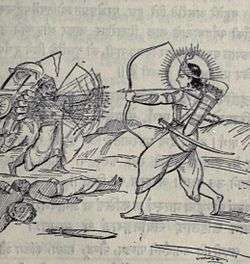Banasura
| Banasura | |
|---|---|
 Banasura battles with Krishna | |
| Information | |
| Children | Usha |
Bana (also called Banasura), in Hindu mythology, was a thousand-armed asura King and son of Bali.[1][2] Banasura is believed to have ruled the present-day central Assam with his capital at Sonitpur (present-day Tezpur, Assam). According to the legend, Banasura was a kirata king. However, according to Himachal folklore, he was the king of Shonitpur, presently known as Sarahan in Himachal Pradesh.[3]
Story
Banasura, a mighty asura once ruled over a large kingdom. So strong and fierce was his influence that all the kings and even some of the devas shuddered in front of his might. Banasura use to worship Rasalingam, which was given by Vishvakarman on instruction from Vishnu. An ardent devotee of Shiva, used his thousand arms to play the Mridanga when Shiva was performing the tandava dance. Shiva gave Banasura a boon and Banasura requested Shiva to be his protector. Banasura became invincible. As time passed, Banasura become cruel and arrogant. He locked up his daughter, Usha in a fortress called Agnigarh because many young suitors came to him asking for her hand. One day, Usha saw a young man in her dream and fell in love with him. Chitraleka was a friend of Usha and daughter of Kumbhanda, Minister of Banasura. Chitralekha was a talented artist who helped Usha to identify the young man seen in her dream, by sketching various portraits. She had dreamt of Aniruddha, the grandson of Lord Krishna. Chitralekha, through supernatural powers, abducted Aniruddha from the palace of Krishna and brought him to Usha.[4] This led to a fight between Lord Krishna and Lord Shiva. Lord Shiva and Lord Krishna negotiated a peace pact. [5] [6] [7] [8] Thereafter, Lord Krishna started severing the arms of Banasura and cutoff all except for two. Meanwhile, Lord Shiva requested Lord Krishna to spare his devotee's life. Banasura too apologized to Lord Krishna and he was forgiven. Aniruddha was then married to Usha.
Family

The genealogy of Banasura is as follows:[9]
- Brahma's son was Marichi
- Marichi's son was Kashyapa,
- Kashyapa's sons were Hiranyakashipu and Hiranyaksha,
- Hiranyakashipu's son was Prahlada,
- Prahlada's son was Virochana,
- Virochana's son was Bali,
- Bali's son was Banasura
Banasura's wife's name was Kandala.
Media and Literature
Banasura's story has been narrated in Indian epic Mahabharata and Bhagavata Purana. His story as the rejected suitor for goddess Shakti is present in Tamil Sangam literary works Manimekalai and Puranaanooru; Bhattavataar's Banasura Katha.[10] The tale of Banasura is narrated in the 15th century epic-poem Ushabhilasa of Shishu Shankara Dasa in the Odia language.
Usha Parinayam (the marriage of Usha-daughter of Banasura) was a Telugu film directed by Kadaru Nagabhushanam under Rajarajeswari films in 1961. Legendary Telugu actor S. V. Ranga Rao played the role of Banasura.[11]
The story of Banasura was shown in Life OK's television series, Devon Ke Dev...Mahadev and the role was assumed by Punjabi actor and model Vikramjeet Virk.
Banasura was also portrayed in the video game Far Cry 4, as the king of Gods in the fictional Nepalese country's mythology and religious beliefs of Kyrat. He was inspired from the real-world beliefs of Banasura being a king of the Kirata people of Nepal as well.
References
- ↑ krishna.com - Glossary description
- ↑ Kumar, Anu (30 November 2012). Banasura: The Thousand-Armed Asura. Hachette India. ISBN 978-93-5009-537-9.
- ↑ - Shri Bhima Kali Temple
- ↑ M. Padmanabhan; Meera Ravi Shankar (1 August 2004). Tales of Krishna from Mahabharatha. Sura Books. pp. 56–57. ISBN 978-81-7478-417-9.
- ↑ Vanamali (2012). The Complete Life of Krishna. Simon and Schuster. ISBN 1594776903.
- ↑ Stephen Knapp. Krishna Deities and Their Miracles. Prabhat Prakashan.
- ↑ Krishna. Har Anand Publications. 2009. p. 68. ISBN 8124114226.
- ↑ Chandra sekhar Singh. The Purans volume-02. Lulu.com. ISBN 1365593274.
- ↑ Bhaleram Beniwal: Jāt Yodhāon ke Balidān, Jaypal Agencies, Agra 2005
- ↑ Kalla, Krishan Lal. The Literary Heritage of Kashmir. Jammu and Kashmir (India): Mittal Publications. p. 11.
- ↑ Usha Parinayam 1961 film at IMDb.
Sources
- Dictionary of Hindu Lore and Legend (ISBN 0-500-51088-1) by Anna Dhallapiccola
- Acharya Chandra Shekhar Shastri: Puranon ki Anmol Kahanian, 2006 ISBN 81-902258-6-3
